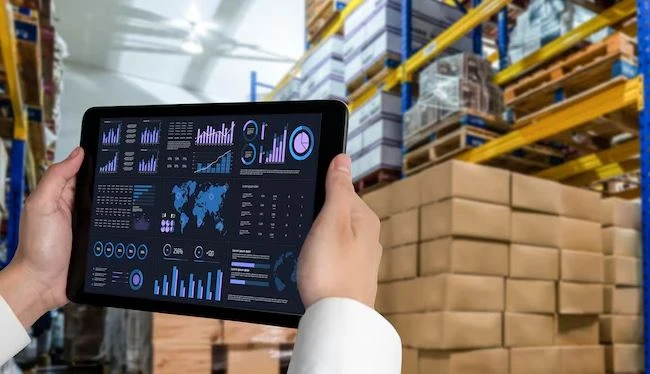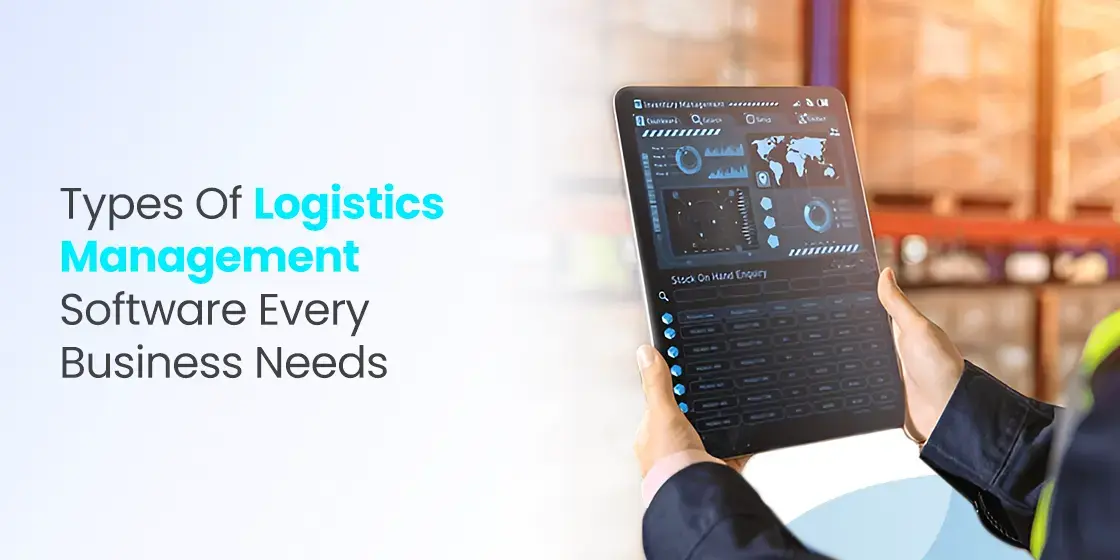Table of Content
Know About the Most Important Types of Logistics Management Software
Managing huge chunks of data and resources often becomes difficult for logistics companies. It is something that can’t be managed manually because tons of data keeps coming in the inventory stack regularly. To ease this operation, businesses require a logistics management software that can manage and automate all the tasks effortlessly. There are plenty of such software available in the industry, offering different types of features and functionalities. By looking into core requirements, you need to identify which software suits best for your business and how it should be integrated in the process.
Generally, ERP is termed as the most used software in the logistics industry. Businesses prefer this software due to its various functionalities that simplifies data management and team collaboration. But other than ERP, there are some other systems also built to streamline operations of logistics companies. A lot of people do not know about these software, hence this blog is written to let them know what type of systems they are.
If you are interested to know how many types of logistics management software are used by the companies, read this blog in detail. Built by professional software development services, these systems offer different features that helps to streamline various day-to-day tasks effectively.
What is a Logistics Management Software?

Logistics management software is a digital solution designed to streamline and optimize the various processes involved in the transportation, storage, and distribution of goods within a supply chain. It helps businesses coordinate and manage the movement of products from suppliers to customers, ensuring efficiency, accuracy, and cost-effectiveness. Key functionalities often include inventory management, order processing, transportation coordination, warehouse operations, and real-time tracking.
At its core, logistics management software provides end-to-end visibility across the supply chain, enabling decision-makers to monitor operations, predict potential disruptions, and make data-driven choices. By integrating with other business systems like enterprise resource planning (ERP) and customer relationship management (CRM), it ensures smooth information flow across departments. The software can also leverage technologies such as GPS, IoT, and AI to enhance route planning, automate tasks, and improve delivery timelines.
In addition to operational benefits, logistics app supports compliance with industry standards and regulatory requirements, reduces human error, and increases customer satisfaction through timely and accurate deliveries. It is widely used across industries such as manufacturing, retail, e-commerce, and third-party logistics (3PL) providers. As global supply chains become more complex, the role of such software continues to grow, serving as a critical tool for companies seeking competitive advantage and operational excellence.
Key Types of Logistics Management Software

As defined above, there are several types of logistics management software used in the industry. Some are specifically used for invoicing, while some help admins in dispatch management and delivery tracking. Here are different types of logistics management software given below.
Enterprise Resource Planning (ERP)
An Enterprise Resource Planning (ERP) system is a comprehensive software platform that integrates and manages core business processes in real time. These processes typically include finance, human resources, procurement, inventory, customer relationship management, and more. By consolidating data from different departments into a unified system, ERP systems provide a single source of truth that enhances data accuracy, and supports informed decision-making across the organization.
Logistics companies use best ERP software to streamline and synchronize their operations. It includes areas like inventory management, order fulfillment, transportation planning, and supplier coordination. With ERP, logistics providers can better track goods, and respond swiftly to customer demands or disruptions. Additionally, ERP systems help improve compliance, reduce operational costs, and increase visibility throughout the supply chain, making them essential for delivering reliable and efficient logistics services.
Supply Chain Management (SCM)
Supply Chain Management (SCM) is the coordination and management of all activities involved in sourcing, procurement, production, and logistics to deliver products from suppliers to end customers. It encompasses the end-to-end flow of goods, and finances across the entire supply chain network. SCM focuses on optimizing processes, and increasing customer satisfaction through effective planning, execution, and monitoring of supply chain activities.
Logistics companies use Supply Chain Management to ensure seamless integration and efficiency across various supply chain functions. By implementing SCM practices, they can improve visibility, enhance coordination with suppliers and customers, and respond more effectively to market demands or disruptions. This leads to more efficient operations, faster delivery times, reduced costs, and stronger competitive positioning in the marketplace.
Partner with our software development specialists to pioneer custom solutions that drive your business forward.
Request Your Solution
Distributed Order Management (DOM)
A Distributed Order Management (DOM) system is a software solution designed to manage and optimize order fulfillment across a complex network of supply chain nodes. Unlike traditional order management systems, a DOM system leverages real-time data and rules-based decision-making to determine the most efficient way to fulfill customer orders. It considers variables such as inventory availability, and service-level agreements to dynamically route orders from the optimal location.
Logistics companies use DOM systems to gain visibility and control over increasingly intricate supply chains. With customer expectations for speed and transparency at an all-time high, DOM systems enable logistics providers to coordinate inventory and orders across multiple channels. Ultimately, a DOM system empowers logistics companies to reduce lead times, minimize stock-outs and maintain a competitive edge in a rapidly evolving market.
Warehouse Management System (WMS)
A Warehouse Management System (WMS) is a software application that helps control and optimize the day-to-day operations within a warehouse. Just like hospital management software, it provides tools for managing inventory levels, tracking goods as they move through the warehouse. A WMS ensures that inventory is accurately recorded and efficiently handled, using real-time data and automation. The system plays a critical role in maximizing storage utilization, minimizing errors, and improving workforce productivity.
Logistics companies use WMS solutions to gain greater accuracy, speed, and efficiency in their warehouse operations. As supply chains become more complex and customer demands increase, a WMS enables logistics providers to handle higher volumes of inventory while reducing operational costs. It also supports integration with transportation and order management systems, ensuring seamless coordination across the supply chain.
Delivery Tracking System
A Delivery Tracking System is a digital solution used to monitor and manage the movement of packages. This system typically uses technologies such as GPS, barcodes, RFID, and mobile networks to provide real-time updates on the status and location of deliveries. It enables both logistics providers and customers to track shipments through web portals or mobile apps, offering transparency and timely information regarding expected delivery times, delays, and proof of delivery.
Logistics companies use delivery tracking systems to improve operational efficiency. By having real-time visibility into their supply chain, companies can better coordinate routes, and respond swiftly to issues. For customers, tracking increases trust and reduces uncertainty, as they are informed about where their goods are and when they will arrive. Ultimately, these systems support better communication, cost savings, and a more reliable delivery process.
Frequently Asked Questions
| What is logistics management software? Logistics management software is a digital tool that helps businesses plan, execute, and optimize the movement and storage of goods. It streamlines processes like inventory management, transportation, order fulfillment, and supply chain coordination. |
| What is a warehouse management system? A warehouse management system (WMS) is software that controls and optimizes daily warehouse operations. It manages inventory, order picking, receiving, and shipping to improve efficiency and accuracy. |
| What are the benefits of logistics management software? Logistics management software improves efficiency, reduces operational costs, and enhances supply chain visibility. It also enables better decision-making through real-time data and analytics. |
Final Words
That concludes our entire article in which we have discussed different types of logistics management software in detail. It is quite important to understand the functionality of every software because they come very handy in managing critical logistics data. By deploying one or two of these software in logistics operations, companies can simplify tasks and save time while focusing on other things. It is a good read for those who are looking to develop a logistics software, as now, they will get a clear idea what type of software they should go for.

Empower your digital journey with StruqtIO - Your dedicated partner for cutting-edge custom software development, innovation, and digital transformative solutions. Harness the power of technology to elevate your business and redefine your digital landscape today.


